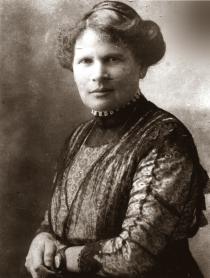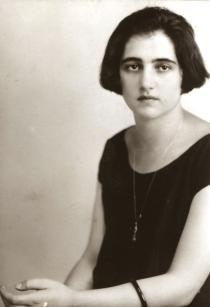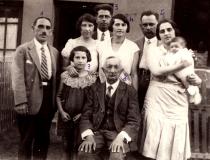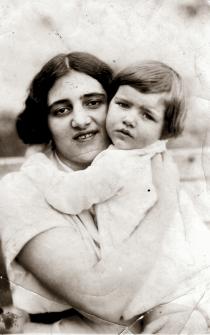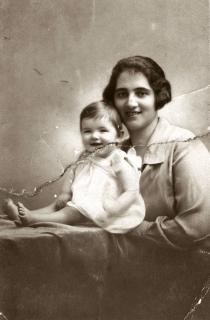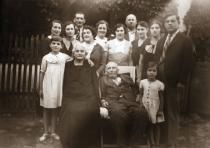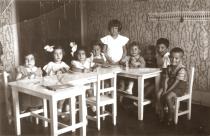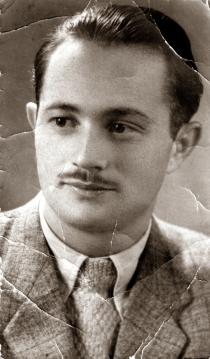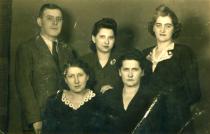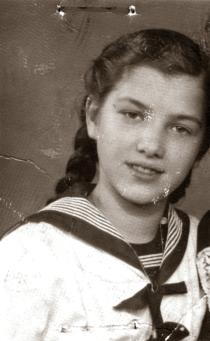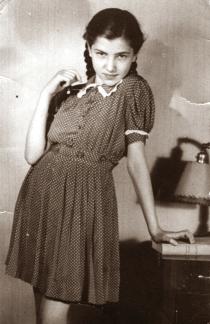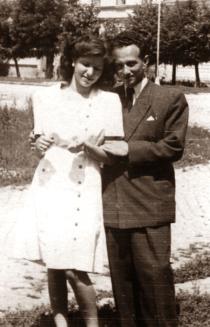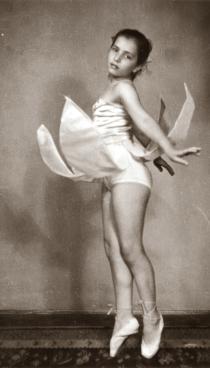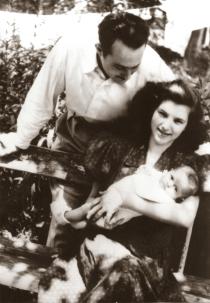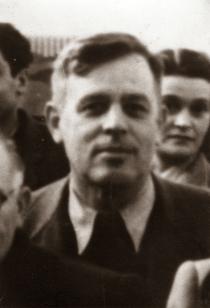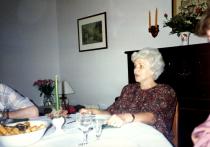This is a photo of my father Albert Bozoky's family, taken in 1930, in Maglod, I think, near Budapest. If you look closely, someone numbered the persons in it. In the back row, starting from left, there are: Jakob Meier, his wife, Elena Meier - my father's sister; she has her arm around their daughter, my cousin, Alice Meier. Behind Elena there's a man whose name I don't remember, he was the husband of the woman standing in front of him: she was my father's sister, Rozalia, who lived in Targu Mures. Near Rozalia there is my father's brother, Emil Bozoky, and in front of him my mother, Johana Bozoky, with me in her arms. The man in the front row, sitting on the chair, is my paternal grandfather, Iosif Stein.
My grandparents on my father's side were called Iosif and Gizella Stein. I know my grandmother was born in 1867, but she died before I was born, in 1927; she died at a rather early age, at 60, because of stomach cancer. Both spoke Hungarian, and I know that my grandfather was a clerk, and my grandmother a housewife. They lived in a village very close to Budapest, a village called Maglod.
After my grandmother had died, my grandfather lived there with my aunt, one of my father's sisters, who was called Elena - or Ilona in Hungarian - Meier, nee Stein. My grandfather died there as well, in 1937 or 1938. I knew my grandfather; sometimes I went during the holidays to my aunt's, when I was little, but I stayed there only a few days a year. But he was already too old, he was over 80 years old; he did love me, but the poor man was already ill and at that age one has very little patience with children, so I didn't have a strong relationship with him. I don't know how religious he was, but no one in our family was a bigot.
The house where my grandfather lived when I knew him belonged to my aunt's husband, a Jew called Jakob Meier, who was an engineer. It had three rooms and a kitchen, I believe, and it had running water and electricity. They kept hens, I remember that, and there were some greens in the garden. My aunt was in charge of the household; she had no help, although they weren't poor people. They had one daughter, Alice, who left for Sweden in 1947. She had a son, George, who was born there in 1948.
My father had three sisters and a brother: so there was Elena Meier, who lived near Budapest, and who was married to Jakob Meier. Another of my father's sisters was Hilda Allenberg, nee Stein, who was married to Leo Allenberg, a Jew who had a timber warehouse near Arad, at Vinga. They lived in Arad and then left for Sweden in 1956, to Stockholm, where my aunt died in 1983. In Sweden, Uncle Leo worked as an accountant at a ready-made clothes factory. They had a son, Victor, who died at 20. The third sister was Rozalia, who was married, but I don't remember her husband's name; he was, however, a Jew from Vienna. She lived with him in Targu Mures, and she died in a concentration camp, in 1944, I think. Rozalia didn't have any children.
My father's brother was called Emil Bozoky [changed from Stein] and he had a textile factory in Budapest, where he also lived. He was married to Victoria, with whom he had two children: a girl, Lea, and a boy, Imre. Then Victoria died, when Lea was twelve years old, in 1928, I think, and he got remarried to Helga, who was a woman with a very beautiful face, but was obese, that's why she died in 1940 or 1941. I only remember that she used to make cappuccino for me when I came to visit, and I didn't like it. After that Uncle Emil married Irma.
My father, Albert Bozoky, changed his name from Stein to Bozoky in the 1920s because he worked with his brother, my uncle, who owned the factory. My uncle was the first to change his name, and my father followed his example, back then he was still single. When Transylvania was returned, the Jews and the other nationalities were generally forced by the state to change their names. Anti-Semitism existed in Hungary even then, and my uncle didn't want a Jewish name to be written on the frontispiece of the factory, he wanted to avoid some problems, for example somebody could have set the factory on fire, or something like that.

